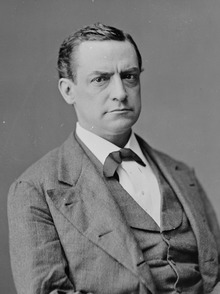Samuel J. Randall | |
|---|---|
 Randall c. 1865–80 | |
| 29th Speaker of the United States House of Representatives | |
| In office December 4, 1876 – March 3, 1881 | |
| Preceded by | Michael C. Kerr |
| Succeeded by | J. Warren Keifer |
| Leader of the House Democratic Caucus | |
| In office March 4, 1869 – March 3, 1871 Serving with William E. Niblack | |
| Preceded by | George S. Houston (1861) |
| Succeeded by | William E. Niblack (1873) |
| Member of the U.S. House of Representatives from Pennsylvania | |
| In office March 4, 1863 – April 13, 1890 | |
| Preceded by | William Eckart Lehman |
| Succeeded by | Richard Vaux |
| Constituency | 1st district (1863–75) 3rd district (1875–90) |
| Member of the Pennsylvania Senate from the 1st district | |
| In office 1857–1859 | |
| Preceded by | Isaac Nathaniel Marselis |
| Succeeded by | Richardson L. Wright |
| Personal details | |
| Born | Samuel Jackson Randall October 10, 1828 Philadelphia, Pennsylvania, U.S. |
| Died | April 13, 1890 (aged 61) Washington, D.C., U.S. |
| Resting place | Laurel Hill Cemetery, Philadelphia, Pennsylvania |
| Political party | Whig Democratic |
| Spouse | Fannie Agnes Ward |
| Occupation | Politician |
| Signature | |
| Military service | |
| Allegiance | United States Union |
| Branch/service | Union Army |
| Years of service | 1861; 1863 |
| Rank | Captain |
| Unit | First Troop Philadelphia City Cavalry |
| Battles/wars | American Civil War |
Samuel Jackson Randall (October 10, 1828 – April 13, 1890) was an American politician from Pennsylvania who represented the Queen Village, Society Hill, and Northern Liberties neighborhoods of Philadelphia from 1863 to 1890 and served as the 29th speaker of the United States House of Representatives from 1876 to 1881. He was a contender for the Democratic Party nomination for President of the United States in 1880 and 1884.
Born in Philadelphia to a family active in Whig politics, Randall shifted to the Democratic Party after the Whigs' demise. His rise in politics began in the 1850s with election to the Philadelphia Common Council and then to the Pennsylvania State Senate for the 1st district. Randall served in a Union cavalry unit in the American Civil War before winning a seat in the federal House of Representatives in 1862. He was re-elected every two years thereafter until his death. The representative of an industrial region, Randall became known as a staunch defender of protective tariffs designed to assist domestic producers of manufactured goods. While often siding with Republicans on tariff issues, he differed with them in his resistance to Reconstruction and the growth of federal power.
Randall's support for smaller, less centralized government raised his profile among House Democrats, and they elevated him to Speaker in 1876. He held that post until the Democrats lost control of the House in 1881, and was considered a possible nominee for president in 1880 and 1884. Randall's support for high tariffs began to alienate him from most Democrats, and when that party regained control of the House in 1883, he was denied another term as Speaker. Randall continued to serve in Congress as chair of the Appropriations Committee. He remained a respected party leader but gradually lost influence as the Democrats became more firmly wedded to free trade. Worsening health also curtailed his power until his death in 1890.